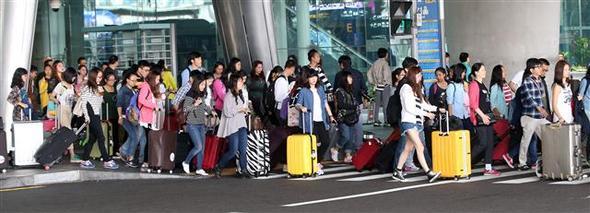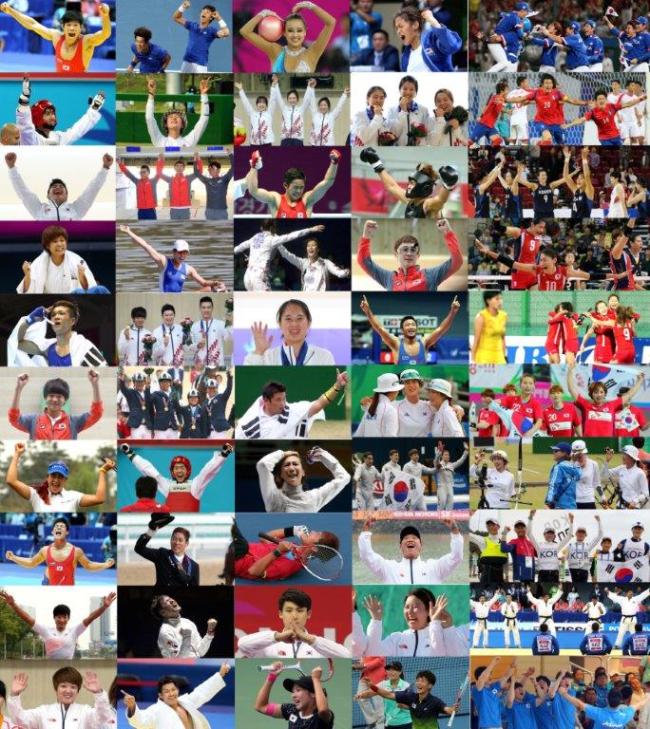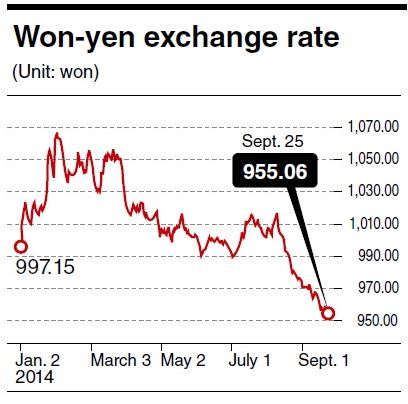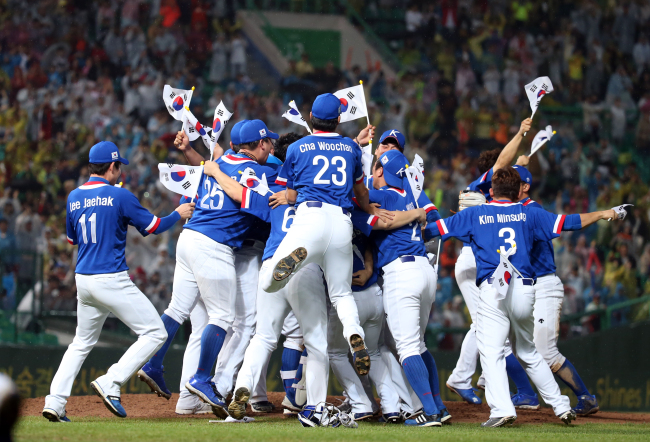 |
A crowd of tourists from China and Southeast Asia leave after arriving Incheon International Airport on Sept. 30, ahead of China’s National Day extended holiday, which lasts from Oct. 1 to Oct. 7. (Yonhap News)
|
Saturday, October 4, 2014
Seoul bracing for crowds of Chinese tourists on holiday trips
[Asian Games] China dominated, North Korea made splash at Asiad
The Asian Games wrapped up on Saturday with China dominating the gold-medal count and North Korea stealing the limelight.
As the final events played out ahead of the closing ceremony, China had won 151 gold medals _ well ahead of the 79 won by host South Korea and the 47 golds that went to Japan. All told, 14 world records were set during the games, which brought together more than 9,500 athletes from 45 countries. More than 40 Asian records also fell.
``These numbers show the development of sports in the region,'' said Sheik Ahmad al-Fahad al-Sabah, president of the Olympic Council of Asia. ``Everybody was satisfied with the success and the level of the games.''
China proved to be well ahead of the rest of the region in the pool, on the track and in an unmatchable variety of the other sports that are included in the games, which feature everything from standard Olympic events to regional specialties like kabbadi _ a rough, tag-like game that is popular on the subcontinent _ to southeast Asian favorite sepak takraw, an acrobatic game that resembles volleyball but is played primarily with the feet.
North Korea turned out to be a major presence _ its athletes won a modest 11 gold medals but set five of the nine weightlifting world records.
After months of bumpy negotiations with Seoul, it sent a delegation of 150 athletes and, in a surprise move, two of its top leaders arrived in Incheon on Saturday to attend the closing ceremony. After each medal, its athletes sang the praises of leader Kim Jong Un, who has been absent from the public eye lately, generating rumors in the foreign media that he is ill or that something more mysterious is going on its esoteric inner circle.
The highlight of the games for North Korea was the women's soccer final against Japan, which North Korea won convincingly 3-1. State media reported the nation was ``seized with ecstasy'' by the victory and quoted farmers, students, coal miners and factory workers saying how they were inspired to work harder for the glory of their country after seeing the match.
The games' most dramatic moment was the South Korean men's win in the soccer final against North Korea.
Playing under tight security before a fired-up crowd of 47,000 in one of the few events that actually drew a capacity crowd during the games, the South Koreans scored in the 29th minute of extra-time after a hard-fought but scoreless match.
The games were not, of course, without controversy.
Along with the perennial disputes over scoring in boxing, which brought complaints from five countries, Qatar's women's basketball team pulled out of the competition without playing a single game because of a rule banning them from wearing their traditional headscarves, or hijabs, on the court. The team said the rule, which is not observed in most other sports, was discriminatory.
``I am upset about the hijab,'' said OCA president al-Sabah. ``There is no reason to reject the hijab, not only for basketball but for any sport.''
He added, however, that he believes basketball's international governing association will rethink its rules in the future, and the experience in Incheon may push that process along.
Officials said a milestone of the games was its doping tests _ more were conducted at Incheon than ever before.
As of Saturday afternoon, six doping cases had been announced, including a gold-winning hammer thrower from China and a gold medalist in Wushu, a Chinese martial art, from Malaysia. But officials said the other athletes _ including a soft tennis player from Cambodia and a soccer player from Tajikistan _ were likely to have ingested banned stimulants without knowing or deliberately intending to cheat.
Organizers and OCA officials acknowledged the cost of hosting the Asian Games continues to be a problem.
Incheon's organizing committee had to work on a reduced budget and touted the event as a model for cheaper, more streamlined Asian Games in the future. Even so, the Incheon games and related infrastructure projects reportedly cost about 2 billion dollars. Saying it simply can't afford such a burden, Vietnam announced it had relinquished its right to hold the next games.
Jakarta will instead be the host in 2018. (AP)
As the final events played out ahead of the closing ceremony, China had won 151 gold medals _ well ahead of the 79 won by host South Korea and the 47 golds that went to Japan. All told, 14 world records were set during the games, which brought together more than 9,500 athletes from 45 countries. More than 40 Asian records also fell.
``These numbers show the development of sports in the region,'' said Sheik Ahmad al-Fahad al-Sabah, president of the Olympic Council of Asia. ``Everybody was satisfied with the success and the level of the games.''
China proved to be well ahead of the rest of the region in the pool, on the track and in an unmatchable variety of the other sports that are included in the games, which feature everything from standard Olympic events to regional specialties like kabbadi _ a rough, tag-like game that is popular on the subcontinent _ to southeast Asian favorite sepak takraw, an acrobatic game that resembles volleyball but is played primarily with the feet.
North Korea turned out to be a major presence _ its athletes won a modest 11 gold medals but set five of the nine weightlifting world records.
After months of bumpy negotiations with Seoul, it sent a delegation of 150 athletes and, in a surprise move, two of its top leaders arrived in Incheon on Saturday to attend the closing ceremony. After each medal, its athletes sang the praises of leader Kim Jong Un, who has been absent from the public eye lately, generating rumors in the foreign media that he is ill or that something more mysterious is going on its esoteric inner circle.
The highlight of the games for North Korea was the women's soccer final against Japan, which North Korea won convincingly 3-1. State media reported the nation was ``seized with ecstasy'' by the victory and quoted farmers, students, coal miners and factory workers saying how they were inspired to work harder for the glory of their country after seeing the match.
The games' most dramatic moment was the South Korean men's win in the soccer final against North Korea.
Playing under tight security before a fired-up crowd of 47,000 in one of the few events that actually drew a capacity crowd during the games, the South Koreans scored in the 29th minute of extra-time after a hard-fought but scoreless match.
The games were not, of course, without controversy.
Along with the perennial disputes over scoring in boxing, which brought complaints from five countries, Qatar's women's basketball team pulled out of the competition without playing a single game because of a rule banning them from wearing their traditional headscarves, or hijabs, on the court. The team said the rule, which is not observed in most other sports, was discriminatory.
``I am upset about the hijab,'' said OCA president al-Sabah. ``There is no reason to reject the hijab, not only for basketball but for any sport.''
He added, however, that he believes basketball's international governing association will rethink its rules in the future, and the experience in Incheon may push that process along.
Officials said a milestone of the games was its doping tests _ more were conducted at Incheon than ever before.
As of Saturday afternoon, six doping cases had been announced, including a gold-winning hammer thrower from China and a gold medalist in Wushu, a Chinese martial art, from Malaysia. But officials said the other athletes _ including a soft tennis player from Cambodia and a soccer player from Tajikistan _ were likely to have ingested banned stimulants without knowing or deliberately intending to cheat.
Organizers and OCA officials acknowledged the cost of hosting the Asian Games continues to be a problem.
Incheon's organizing committee had to work on a reduced budget and touted the event as a model for cheaper, more streamlined Asian Games in the future. Even so, the Incheon games and related infrastructure projects reportedly cost about 2 billion dollars. Saying it simply can't afford such a burden, Vietnam announced it had relinquished its right to hold the next games.
Jakarta will instead be the host in 2018. (AP)
[Asian Games] Asian Games News Service wraps up successful coverage of 17th Asiad
 |
The AGNS team, most if not all, traveled to more than one venue on any given day. In order to provide live coverage of each match, the reporters and sports experts were the first ones on site and the last to leave, making sure each of the competitions and press conferences were attended, while any important quote had been taken down.
The AGNS website located in the “myINFO” homepage of the Incheon Asian Games main site, received, on average, 77,000 views a day during the Asian Games. Including the daily views for the Korean articles posted, the press conference and important notices, the total views add up to well over 110,000 views daily.
In the midst of the games, the AGNS team had the pleasure of interacting with the thousands of media reporters, photographers, and press managers alike.
“One of the strong points is when you have a program like this it helps because most often you are caught up for time. When you travel your body takes a beating going all around to different venues. It helps, believe me. Quick quotes, you need it. The gold medal result comes out, you look at quote, you add it in and in five minutes the article is up,” Alaric Gomes of the United Arab Emirates Gulf News shared.
“For the Asian Games, its just me alone for Gulf News. I'm normally a guy who doesn't sit in one place, I go to at least three different events a day and that is too much for anyone. I can't be everywhere at once so the AGNS service is definitely something I need, I can't rely on anyone or anything else," Gomes continued.
"I trust the service enough to use it in our newspaper. I've used it in the past, I know it is reliable. It’s here to help, and I appreciate the work they do. For one person to do it, it's impossible. This is not a sprint, it's a marathon, I really appreciate the help I can get.”
“One of the strong points is when you have a program like this it helps because most often you are caught up for time. When you travel your body takes a beating going all around to different venues. It helps, believe me. Quick quotes, you need it. The gold medal result comes out, you look at quote, you add it in and in five minutes the article is up,” Alaric Gomes of the United Arab Emirates Gulf News shared.
“For the Asian Games, its just me alone for Gulf News. I'm normally a guy who doesn't sit in one place, I go to at least three different events a day and that is too much for anyone. I can't be everywhere at once so the AGNS service is definitely something I need, I can't rely on anyone or anything else," Gomes continued.
"I trust the service enough to use it in our newspaper. I've used it in the past, I know it is reliable. It’s here to help, and I appreciate the work they do. For one person to do it, it's impossible. This is not a sprint, it's a marathon, I really appreciate the help I can get.”
Lee Hoo-min, of NewsOne said of using the AGNS website, “We have a team of eight here at the games. When I, or my team, cannot make it to the a particular competition, or if we miss the chance to interview an athlete, AGNS news has been very helpful. I was satisfied with the information given.”
Yoshiaki Shichino, of Kyodo News, also complimented the AGNS team’s speediness, “They are really good and quick. When I need some quotes or important info, they are really helpful and they really give good information beyond the scoreboard. The reporters also speak fluent English which is a big help to reporters, especially when trying to interview other athletes.”
In addition to reporters using the AGNS website, live broadcasters have shared their account of using the services.
“We have an office in the IBC but we go out to the venue and do the live broadcast for the competitions. We have certainly used the AGNS news service during our broadcasts because it provides live updates, especially quotes from athletes that are needed especially when we do a broadcast right after the game has finished,” explained Daniel O’Hagan of Asian Broadcast Union.
“Everything we have that can help the broadcast, is useful and the AGNS news being there certainly helps. We've certainly used them in broadcasts for volleyball and beach volleyball, and football. We trust the information enough to use it in the broadcast.”
“We have an office in the IBC but we go out to the venue and do the live broadcast for the competitions. We have certainly used the AGNS news service during our broadcasts because it provides live updates, especially quotes from athletes that are needed especially when we do a broadcast right after the game has finished,” explained Daniel O’Hagan of Asian Broadcast Union.
“Everything we have that can help the broadcast, is useful and the AGNS news being there certainly helps. We've certainly used them in broadcasts for volleyball and beach volleyball, and football. We trust the information enough to use it in the broadcast.”
Press managers, who handle the countless press conferences given after each award ceremony for the hundreds of athletes have also shared their encounters with the AGNS team.
“AGNS has been a big help, especially when the press isn’t there or the press do not provide the questions needed to proceed with the press conference. They were always very reliable. At the weightlifting venue in particular, there would only be one or two reporters in the conference room with the medalists. Without AGNS being there, we might not have been able to have a press conference at all,” shared Press Manager Suna Jung.
“In my experience with the AGNS reporters, they have always acted professionally, and always gave their best efforts, even to athletes who had not earned a medal, they had gone out of their way to interview them and congratulatedd them on their efforts. I was a translator for the press conferences and the AGNS reporters had provided sharp questions for the athletes and they were a pleasant surprise to the press conference. At times where I was not able to attend competitions from the beginning to the very end, I could turn to one of the reporters for in-depth briefing on what had happened,” shared Press Manager Hwang Hyun-jung.
The AGNS team will be continue coverage until the very end of the games, coming to a close today finishing up with Karate, Table tennis, and Soft Tennis.
The 17th edition of the Asian Games hosted in Incheon will be coming to a close on Saturday night, October 4th with the Closing Ceremony, beginning at 6:00 p.m.
By Alex Isacc (AGNS)
(Photo Credit: Yonhap)
By Alex Isacc (AGNS)
(Photo Credit: Yonhap)
Monday, September 29, 2014
Won-yen rate may drop to 800 won
The won-yen exchange rate is likely to drop to the 800 won level in the third quarter of next year as Japan is expected to continue quantitative easing to boost its economy, according to global financial companies like JP Morgan and Citibank.
French bank BNP Paribas projected the bleakest outlook, claiming that the rate could nosedive to 700 won per 100 yen next year.
The rate dropped below 960 won (92 cents) this month, the lowest since Aug. 2008, when it posted 954 won.

“The weaker yen may undercut price competitiveness of Korean goods in overseas markets by making them relatively more expensive than the products of their Japanese rivals,” industry watchers said.
Industries likely to be hurt by a stronger won include tech, steel, auto and oil-related businesses.
As a case in point, in the auto industry, operating profits of Hyundai Motor and Kia Motors, whose car exports account for 80 percent of total sales, saw a 13-32 percent drop in the second quarter, compared to a year earlier.
Meanwhile, Japan’s big three companies including Toyota saw their business profits rise by 4-13 percent during the same period.
Small exporters will be dampened the most by the strong won. According to Industrial Bank of Korea, loans of small and medium enterprises stood at 75 billion won in the second quarter, a 92 percent increase from 39 billion won from the previous quarter as they are having financial difficulties due to currency fluctuations.
If the trend continues, the Bank of Korea will be pressed to further lower the key interest rate in a bid to help local exporters hit by the strong won. Some experts said that fiscal policy can lessen the effects of the weak yen.
“The time is ripe for the government to take into account the fluctuation of won-yen rate,” said Yun Chang-hyun, head of the Korea Institute of Finance.
Lee Ju-yeol, governor of the Bank of Korea also hinted a possible rate cut at a recent policy seminar. “If Japan continues quantitative easing, the won will strengthen against the yen, further hampering Korea’s export competitiveness,” he said.
Finance Minister Choi Kyung-hwan raised similar concerns last week during the Group of 20 meetings in Australia.
Market watchers say the biggest worry is that the government may not have the effective tools to stave off the impact of the falling yen.
“The won-yen exchange rate is an arbitrary rate. There isn’t much that we can do,” Choi said in Australia.
By Shin Ji-hye (shinjh@heraldcorp.com)
French bank BNP Paribas projected the bleakest outlook, claiming that the rate could nosedive to 700 won per 100 yen next year.
The rate dropped below 960 won (92 cents) this month, the lowest since Aug. 2008, when it posted 954 won.

“The weaker yen may undercut price competitiveness of Korean goods in overseas markets by making them relatively more expensive than the products of their Japanese rivals,” industry watchers said.
Industries likely to be hurt by a stronger won include tech, steel, auto and oil-related businesses.
As a case in point, in the auto industry, operating profits of Hyundai Motor and Kia Motors, whose car exports account for 80 percent of total sales, saw a 13-32 percent drop in the second quarter, compared to a year earlier.
Meanwhile, Japan’s big three companies including Toyota saw their business profits rise by 4-13 percent during the same period.
Small exporters will be dampened the most by the strong won. According to Industrial Bank of Korea, loans of small and medium enterprises stood at 75 billion won in the second quarter, a 92 percent increase from 39 billion won from the previous quarter as they are having financial difficulties due to currency fluctuations.
If the trend continues, the Bank of Korea will be pressed to further lower the key interest rate in a bid to help local exporters hit by the strong won. Some experts said that fiscal policy can lessen the effects of the weak yen.
“The time is ripe for the government to take into account the fluctuation of won-yen rate,” said Yun Chang-hyun, head of the Korea Institute of Finance.
Lee Ju-yeol, governor of the Bank of Korea also hinted a possible rate cut at a recent policy seminar. “If Japan continues quantitative easing, the won will strengthen against the yen, further hampering Korea’s export competitiveness,” he said.
Finance Minister Choi Kyung-hwan raised similar concerns last week during the Group of 20 meetings in Australia.
Market watchers say the biggest worry is that the government may not have the effective tools to stave off the impact of the falling yen.
“The won-yen exchange rate is an arbitrary rate. There isn’t much that we can do,” Choi said in Australia.
By Shin Ji-hye (shinjh@heraldcorp.com)
[Asian Games] S. Korea wins gold medal in baseball

Published : 2014-09-28 22:09
Updated : 2014-09-28 22:09
Updated : 2014-09-28 22:09
 |
South Korean baseball players react after winning the final match against Chinese Taipei during the 17th Asian Games Incheon Sept. 28. (Yonhap)
|
INCHEON (Yonhap) – South Korea captured its second straight Asiad baseball gold medal at home on Sunday, defeating Chinese Taipei 6-3.
The host scored four runs in the top of the eighth inning to erase an early deficit on a rainy night at Munhak Baseball Stadium.
With South Korea clinging to a 4-3 lead in the eighth, Hwang Jae-gyun knocked in two more runs with a single to provide more breathing room.
South Korea has won four baseball gold medals since it became an Asiad medal sport in 1994.
Subscribe to:
Comments (Atom)



